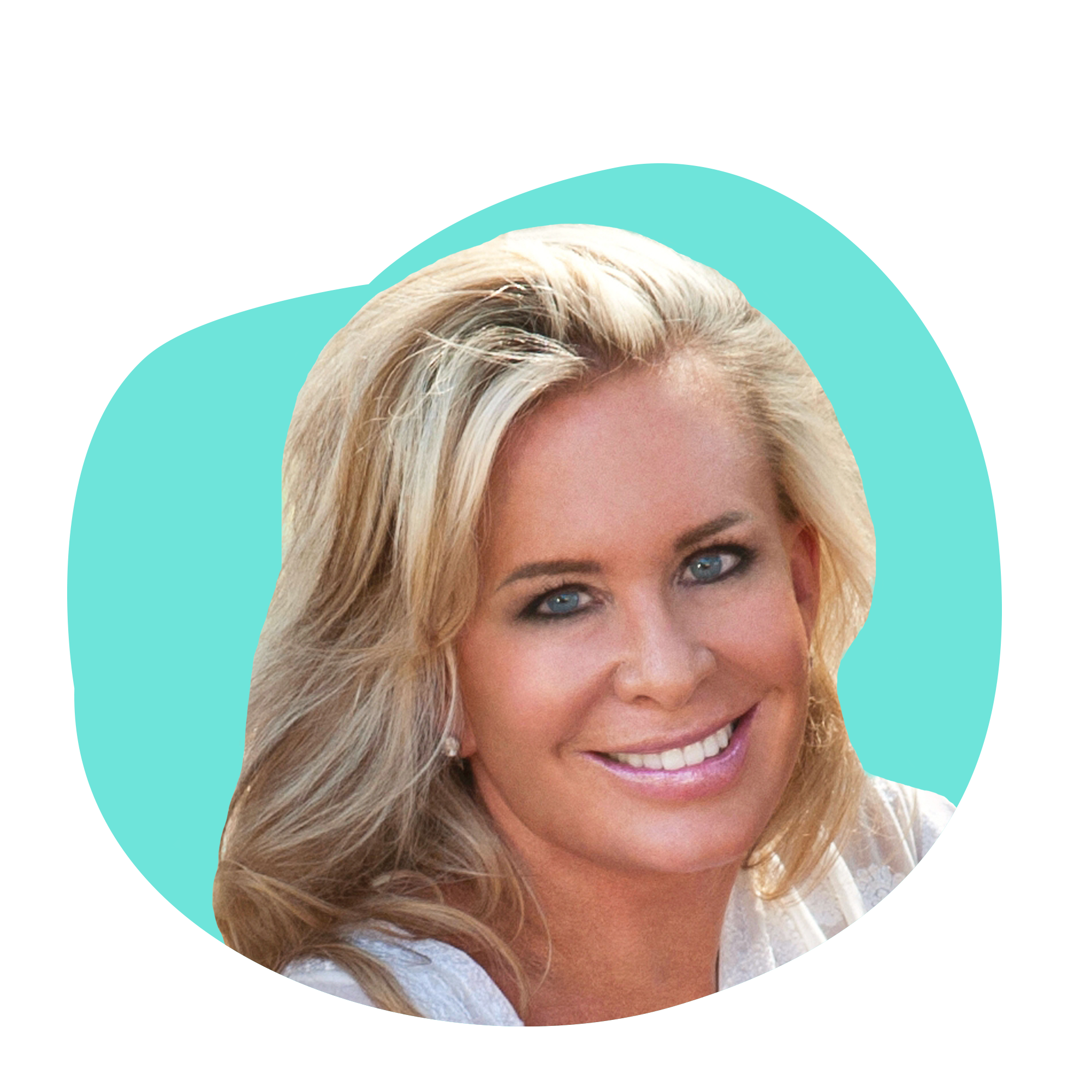Tracy McLaughlin – Top Real Estate Agent & Author of Real Estate Rescue
Episode 82

Resources from
this episode:
Enjoying this episode of #TheKaraGoldinShow? Let Kara know by clicking on the links below and sending her a quick shout-out on social!
Follow Kara on LinkedIn – Instagram – X – Facebook – TikTok – YouTube – Threads
Have a question for Kara about one of our episodes? Reach out to Kara directly at [email protected]
Transcript
Kara Goldin: Hi everybody. It’s Kara Goldin from Unstoppable, and we’re here today with my friend and fearless real estate mogul Tracy McLaughlin. I’m super excited to have her here today. We are going to talk a little bit about Tracy’s journey, but she also just wrote this book called Real Estate Rescue, which is so good. Tracy was not only my realtor, full disclosure, but also just a person that I was always asking her for advice on, “Tracy, what if I did this? What if I did this? What if I did this?” I mean, she knows how to not only buy real estate, but sell real estate. I want to talk to her a little bit about what’s going on now and the midst of COVID life and people moving and selling and buying and all of that kind of stuff too. But anyway, Tracy, welcome. Super excited to have you here.
Tracy McLaughlin: Thank you so much for having me. I’m excited. I’m really excited to talk to you, Kara.
Kara Goldin: Super, super excited. So she’s one of the top real estate agents in the country. I met her in Marin County. She’s currently, she just showed me a picture for those of you listening on audio in Aspen, where she is right now and it’s snowing in the middle of September. I mean, what is going on in this country? It’s an insane what’s going on with the weather. But anyway. So Tracy, I’m looking at some of these stats. She was named Marin County’s top producing agent in 2019 for a record breaking … Okay, everybody ready for this? 14th straight year. I mean, this is insane, Tracy. It’s crazy. I’m so proud of you. With over 176 million and close transactions.
Wow. She was ranked number 20 in the country, number 10 in California. I mean, this list goes on and on. She’s the real deal in terms of real estate. And her understanding of just the local markets and I think it’s even bigger than that. I think you’ve just got a gut for just consumers and buying and selling and everything around the luxury market, you’ve just got such a grasp of what’s going on out there. And I want to talk not only about her book, but also is there other stuff going on in the Tracy media world? I don’t know if we could talk about it or not, but I’m excited to ask her about it. So Tracy, welcome and really excited to have you.
Tracy McLaughlin: Thank you. I really appreciate [inaudible 00:02:56], Kara.
Kara Goldin: Yeah. So take back to the beginning. How did you get into real estate?
Tracy McLaughlin: Well, I fell into it backwards and very accidentally. I was in working in television news as an anchor reporter for various NBC affiliates around the country. And then I had gone on to cohost and co-produced my own television called Jeeps Inside Skiing, which was shot all over the world and largely about skiing resort communities. It was a half hour PM magazine format show. And I was four months pregnant with our first child and we were scheduled to go over to Russia and hop into these Russian military helicopters and do all of this-
Kara Goldin: What? This is crazy.
Tracy McLaughlin: Yes. And my husband, my then husband said, “That’s it. No more traveling for you on that show.” It was a total adventure show. I was four months pregnant and he didn’t want me traveling. And I thought, what am I going to do? This is the only world I know is journalism. So we bought the house down the street from us in Tiburon, where we lived at the time and I flipped it. I just seemed to have a sixth sense. I walked in, I understood what to do to monetize the home almost very, very naturally and without a lot of education in that arena and we made great money. And I thought, oh, that was kind of fun and easy. I’ll try another one of those. And we kept doing them. I eventually got my license and then eventually really went full throttle into the brokerage business. I had no idea. I was an English literature major. I loved journalism. I love writing. The last thing I ever thought I would do is go into sales. Talk about not predicting your future. So that’s how it happened.
Kara Goldin: That’s crazy. So now you’re with the agency. And tell me a little bit more about that.
Tracy McLaughlin: Yes. I grew a couple of brokerages, including Pacific Union, which became one of the top brokerages in the country. We sold that to Compass, which is a huge, it’s a bohemoth. And I’m a brand person and I like to feel and touch a brand. And I felt that just because of the largest of Compass, that it would we better fit for me to be at a more of a boutique brokerage that has a very strong brand recognition. And I also like Maurice [inaudible 00:05:10] a lot. He’s the founder, he and Billy Rose. It’s got a lot of entertainment clients. There’s a lot of back and forth between LA and the Bay Area. And they’re real innovators. They’re, “Hey, you like Aspen? Let’s open a shop and Aspen, Tracy.” I mean, they’re sort of willing to do anything, very entrepreneurial spirits. So that’s why I decided to go with the agency. And it’s been a lot of fun. It’s a great brokerage.
Kara Goldin: So you’re doing real estate with them in the Bay Area, as well as Aspen?
Tracy McLaughlin: Yeah. It’s almost exclusively Marin County right now, but they did recently opened an office here and I’m building a home here. And so it’s just nice for me to also have a place to hang my hat when I’m here. But my transactions are largely Marine County still and a little bit of San. I love it. Very, very cool. So
Kara Goldin: Talk about real estate right now. I mean, obviously, especially from the Bay Area, lots of people, I feel like coming and going. I mean, and you and I haven’t talked about this before the call, but Marin County I feel like is still, there’s a lot of people shifting into … Marin County real estate is pretty hot right now, correct?
Tracy McLaughlin: Oh my gosh. I mean, who would have thought that we would be the beneficiary of a pandemic? I mean, when we got the notification for shelter in place, I think that was March 9th, I went into this immediate, oh my gosh, we’re at the top of a roller coaster. We’re going to drop off like we did at 9/11 and again in 2008 with the mortgage banking crisis. I just was prepared for the absolute worst. I mean, none of us could predict what was going to happen when every business is shut down and nobody’s leaving their homes. And it turned out actually just to be the opposite as things started to open up, I’ve never in my career, seen more unanticipated decision making and immediacy of need then I’ve seen in the last six months.
I mean, people that were lifetime San Francisco, I’ll never leave the city. I’ll never be a suburban person, packed their bags, drove over the bridge, bought something in the first round of showings. And that’s really been going on consistently now for six months. And the main message is, I want an open great room that leads directly to the pool, indoor outdoor living and recreational components at my domicile, because my kids are learning here eight hours a day, and then they need to go blow off some steam, so they need to swim. They need to go down to the gym, they need to lift weights. Whatever you can do to create recreation at home is what’s trending Marin right now. So it’s been really interesting to watch just huge, consistent pilgrimage coming from San Francisco to Marin County.
Kara Goldin: That’s it. And you talked about San Francisco and you ended up buying a place in San Francisco. So I mean, I love that. I really think you have vision. And what do you think is happening for San Francisco right now? I mean, do you think [inaudible 00:08:21] buyer’s market? What is your thoughts on it?
Tracy McLaughlin: Yes, certainly for condos it’s a buyer’s market right now, which is part of the reason I did it. Just for obvious reasons, people don’t want vertical living. They don’t want to be in elevators. They don’t want to have to go through door men or whatever. They don’t have to contact a lot of people to get in and out of their homes right now. We haven’t seen a softening in the San Francisco market for over 10 years. And so that particular component of the market is weak right now. And I thought, why not? I mean, it’s always good I think, to sort of hedge when things seem soft. And so I went ahead and I went, I’m going north across the bridge. Everybody else is coming South, but I’m glad I did it. It will be fun experience too to be back in San Francisco.
Tracy McLaughlin: I think San Francisco, because there’s been so much press about the homelessness and I’m sort of the Exodus out of the city, I’m very hopeful that that’s going to put a lot of pressure on the powers that be there, a [inaudible 00:09:23] powers, private citizen groups that are trying to do something about homelessness, because we need to take our city back. You know, you work there. And I think that will be even a little bit more imminent because of this pandemic. I think it’s forced the issue to the table more so.
Kara Goldin: I totally agree. So where do you see, what other parts … Obviously, not everybody listening to this podcast or living in the Bay Area, where do you see are the hot places outside of Marin County where people are moving? And what are they looking for besides the indoor, outdoor living and things like that? What do you see as the hot cities where you’re hearing people wanting to go to?
Tracy McLaughlin: Yeah. I mean, I hate to say this, I’m not a political person, but a lot of this is tax driven. And so Austin, Texas on fire, Nashville, Tennessee, on fire. I don’t mean literally, but you know. But wrong to use right now, but Nashville, Tennessee growing enormously. South Carolina, Charleston, South Carolina. These are really beautiful cities that have a lot of historic component to them, not so much Austin, but the other two certainly do. And they’re very affordable and you can buy double or triple what you can own in most areas of the Bay Area and there’s wonderful schools. There’s a great lifestyle. Certainly in Nashville, there’s a great music scene going on. In Austin, great restaurants and music. And so those three cities, absolutely, for sure. And then of course there’s other ancillary markets that are doing very well. And those are all, a lot of people are making Florida. Lot of my clients, certainly that live in Ross, in surrounding areas and Marin County are opting for Florida. That’s not a state that you typically see Californians moving to. And yet the tax incentivizations and the lifestyle, they’re really favorable to people right now, so.
Kara Goldin: It’s so interesting. So let’s get into your book. I’m super excited. So real estate rescue, so how Americans leave billions behind in residential real estate. So what are the key things that, I mean, I always think not only my phone calls, but everybody else calling you saying, “Hey Tracy, what do I need to do to my home?” What are the simple things that you share with people when they’re thinking about selling their home?
Tracy McLaughlin: That’s a great question. And I’m almost at a point now I do it on FaceTime for people just as a pro bono thing to help people around the country. So you’d really don’t even have to walk into somebody’s house to understand exactly what needs to happen right now to sell your house for the highest price. So the larger you start with, the bigger umbrella component, which is if your house is not a tear down. I mean, when a home has reached a point where all the doors and windows are shot and the ceilings are low and there’s a second story above it and every system needs it, then you just sell it for lot value and a little bit of structure value and you move on with your life. So this does not apply to every home, but if your home still has a significant amount of structure value and there’s good ceiling height, the simplest remedy, and this is what you’ll see, you’ll see all the befores and afters in the book, is flooring change, wall color change, lighting changes, and just counter surface changes.
If you take the before and afters in my book, and you look at the split screen between a house that had dark yellow walls and an old fashioned, 1980s chandelier, and you put a contemporary drum light with all white walls and modern art, it photographs like an entirely different home and sometimes a brand new home. Yeah. So it’s about palette. It’s about the consistency of the palette and it’s about the materials you’re using for the marketing of homes. And you can do a lot of cheating and make your house almost look new with the optics of those suggestions.
Kara Goldin: That’s awesome. And then how do you avoid the common emotional traps? Like the, “Wow, that was my grandmother’s.” And what do you share with people about some of those elements that they just don’t want to let go of?
Tracy McLaughlin: I have to tell you, and that’s why I wrote this book actually. It’s such an ironic position that we’re in. I mean, if you think about what I do for a living, we’re managing people’s biggest assets. We are money map managers and yet there’s very little scrutinization that goes on with the vetting of real estate agents. I mean, all we have to do is be 18 years of age, 60 hours of Anthony’s school, get a license and I can come tell you Kara, anything you want to hear because you’re so emotionally tethered to the asset because you have memories there, you’ve raised your children there. You loved that chandelier when you bought it in 2002 on vacation in Bali or whatever. I can walk in and tell you what you want to hear. And the biggest challenge we have is telling people what they do not want to hear.
That is the vortex. That’s the sort of push pull that goes on in my job all day, every day. The irony is people that are really good at this business, they want to help people. They want you to make more money on your home. And yet the poking at us that comes back from the seller, the resistance to change, the not understanding what sells for the most amount of money. Because if you think about it, we move into our homes, right? I remember our first house, that chintz Ralph Lauren sofas, yellow with big floral sign. You know one of those big heavy chandelier’s that I’m talking about, yellow wall [inaudible 00:15:12]. Remember the dining rooms were always that maroon color, like that saturated maroon? And what happens is people, they design their homes when they first purchased them and they never let go of loving them.
And so when you come in 15 or 20 years later, and you say, “Listen, I’m doing this for your benefit.” They don’t understand white walls. They think it stark. They think it’s boring. They would never want to live in white walls. They don’t understand why their walls have to change. They don’t like contemporary lighting. So you’re fighting against people’s own personal beliefs and tastes that they attach themselves to emotionally when they first bought the asset. And that’s why it becomes, there’s so much sort of push pull in our business and candidly a lack of belief or trust in real estate agents, because of the educational level that I referenced a few minutes ago. That’s the Genesis of this book. And that’s why our industry is largely not believed, not trusted, because we don’t have the same educational levels as a stockbroker broker, or a lawyer, a doctor.
Kara Goldin: And how do you find those great realtors? I mean, outside of you, of course, but what do you think are the key things that you really want to look for?
Tracy McLaughlin: You want it absolute and it’s is so easy now with all of this information is at our fingertips. You want to look up who is consistently in the top five to seven of realtors in your area, okay? You don’t want to hire Aunt Tess because she recently got licensed and you owe and Aunt Tess a favor. That’s what happens all the time in our business. So-and-so listened to my divorce woes. She took the time. She just got her license. I want to help her out. I’m going to give her the listing. I mean, how these decisions are made are absolutely incredulous to me, but that’s how people make the real estate. The biggest asset, 40% of America’s wealth is tied up in its principle of residence. And yet we’re handing the baton of control over that to people who have no business managing that mostly. So what you do is you look at the top five to seven or eight people that consistently perform year after year, and then you actually take their references and you call their references.
How often was Tracy at your house actually showing it? How often did she follow up? Was her advice sound? Did the house sell percentage of original price to where it traded? What was that percentage? If it was 10, 12, 15, 20%, Tracy, didn’t do a great job. We should be selling our listings very close to the original price, one, 2% below at the most, if you understand what you’re doing in this business. So those are the kinds of questions that people should be asking. And it’s such a huge decision. I’m just really encouraged people, take the time to investigate who you’re hiring to sell your house. And same with buyer representation. There are people you remember Kara, you came out from San Francisco. There are people that stumble into Ross and they don’t know some areas are shady. They didn’t realize there was ambient road noise over here. They didn’t realize the blah, blah, blah. Those inside things need to be communicated too, to buyers to understand if the asset is going to really grow year after year and what you can or can’t do with a home is also obviously really important on the buy side.
Kara Goldin: Do you just ask that of the realtor? I mean, how do you find that though? Do you ask them, “What are the shady sections in this area?” Is that really what you ask? I mean, how do you-
Tracy McLaughlin: Yeah. I have buyers that are pretty thorough when they’re interviewing me over the phone. Despite my reputation, I still get interviewed formally over the phone by buyers saying, “We want to understand how you work.” And what I always suggest to people, and this is a really great thing to do on the buy side, once you’ve selected the realtor, get in the car with them and drive neighborhoods. Just go up and down streets. “Tell me about the left side of the street. Tell me about the right side. Tell me where that house last traded and why did it go up to 5 million versus that one never really.” Ask those questions in a drive through. I always tell people it’s about two to three hours of car time to really educate people on a community and it’s great time, very well invested on the buy side.
Kara Goldin: I love it. That’s awesome. What is the number one thing that people need to do? I mean, you talked about colors and staging. Do you believe staging is an important thing for most people?
Tracy McLaughlin: Yes. I mean, I almost won’t take … It’s not that I won’t take a listing if somebody won’t stage their home. There are less expensive alternatives to staging. And actually this year, for some reason, I’ve been using this alternative very consistently. So if you don’t want to spend on average in Marin County, it’s somewhere between 12,000, 15,000 on the low end into about 30,000 for a larger home for staging art, accessories, et cetera. I cannot tell you how big of a return there is on that. I understand because they run numbers all day, every day, and I watched homes that were staged and the seller got sick of showing them and took the staging out. It costs people about $300,000 in an over $1.5 million price range to remove staging. That’s how critical it is to showing your asset.
If you don’t have the money to stage, and you have some pieces that are usable and things that workable, there’s two great alternative furniture rental companies. You can live on the furniture. You can use it unlike staging. And they’re doing a pretty good job with monthly furniture rental right now. And then you can go and rent good, great contemporary art at MoMA. So there’s ways to stage without having to that full throttle investment that will still really improve the value of your home. So unless your house was just done by a top designer, that is a critical component of making the most amount of money on your house.
Kara Goldin: That’s awesome. So people looking to get into a business, do you think actually buying and selling real estate is something that is a viable solution? I mean, obviously many people are in a situation today where they’re trying to figure out what they want to do next, so either furloughed, or fired from their position, or their company is not doing great. What do you think about real estate as a profession?
Tracy McLaughlin: Yeah, I mean, I think, I think it’s so interesting, Kara, when I was working in my thirties and forties in this business, I mean, I didn’t really know that many people who were my contemporaries doing it. It’s very interesting to watch once people get a little bit older and they want more flexibility and they want to be able to still go to their children’s recitals or whatever. It’s a great business because there is flexibility. It doesn’t mean you don’t work all the time if you’re going to be really good at it, but it has a little bit more of a malleability to it. I think it’s an incredible business. I think if you put your head down and work very, very hard and you do this, I mean, it’s not 24/7, but it’s almost that. You have to be incredibly responsive.
You have to call people right back. It doesn’t matter if you’re on vacation. It does not matter if you’re having a child in the hospital, you have to respond to your clients. I mean, [inaudible 00:22:43] that, if you’re going to lose a house and your agent isn’t available and you’re in some kind of, that house is going to get sold in somebody isn’t picking up the phone, there will be somebody else who will pick up the phone for you. So you constantly got that pressure on you. So I think it’s an incredible business. Our fee structure, ironically, really hasn’t changed since I got into the business. People thought, oh, real estate agents are going to be necessary. They’ll be algorithmic machine that will go ahead and do deals with. It’s actually the opposite right now.
The transactions are so complicated. There’s such a great legal component to what we do for a living that you really cannot rely on algorithms and data to go represent yourself to buy or sell homes. It doesn’t work. So in as far as flipping goes, I think the flipping business is great. I think there’s always margins in markets that aren’t quite as frothy as what’s going on right now. I mean, you have to literally go after markets like I just did in San Francisco that have renounced softening. I’ve noticed in Marin County, in the last five years, it’s been very hard to find margins to flip because everything’s bid up so much by owner users. The developers haven’t really been doing a lot in Marin in the last five years, so that’s really a more specific choice.
Kara Goldin: That’s interesting. Where do you think that that’s possible, where you could go into a market? What’s your big [inaudible 00:24:10]?
Tracy McLaughlin: Asoen, Colorado. I mean Aspen’s one of the frothiest markets in this country. When it dips, it hardly dips and it recovers right away. It just has so much demand from all over the country and all over the world. So the core, the downtown area right now is priced out. But the areas just around the core, I think still have great margins and them, because there’s such surging demand to be in places like Aspen. Colorado is a great state for investment, I think right now.
Kara Goldin: Yeah, I totally agree. So what are the key things that people, why should people buy this book? I’m curious what you would say. I mean, for me as a homeowner, I learned a ton, but I also think that for a person that’s thinking about it as a business, I think that that’s where I learned a ton about this as well. And it got me really thinking, but I’m curious [inaudible 00:25:08].
Tracy McLaughlin: Oh, I’m so glad.
Kara Goldin: Yeah. I mean, I think you buy the book because, what does it take? Four or five hours to read that book. The most impactful component of that book is helping people understand how much they need to neutralize themselves and disassociate themselves from their biggest asset to do the very best job they can selling it. It’s a very strange, I mean, you don’t get emotionally tethered to your stocks that you buy. If you bought an apartment building, you decided to sell it, you and be really emotionally tethered to your apartment building. It’s the only asset where there’s this blend of emotions, attachment, and money, and it makes it very convoluted. So I think reading that there’s a lot of case study you can see in that book about why people do that, how they overinflate the opinion of their own homes value.
Kara Goldin: And so there’s a lot of the case studies and a lot of the research we did, I think were really interesting to show people why you should not do that. And then of course, it gets into a lot of more pragmatic things like every time I walk into a house, when someone does that, ouch, like, “Oh God, we didn’t want to tell you, but we actually built, 500 square feet without permits.” And I just do that, “Please tell me you didn’t do that.”
Tracy McLaughlin: Yeah, don’t do that. Why’d you do that?
Kara Goldin: There’s practical components to the book too. You’re either going to pay for those permits and get burned when you sell the house. You’re going to pay for those permits at some point, do it before you sell your home. The complexities that arise out of last minute surprises really cost people their asset. Everything I’m doing in my business right now is to avoid risk and avoid surprises and have a very well oiled, organized machine where once that house goes into contract, that’s the end of it. We can all go back home, go to bed, relax. We do pre-listing inspections so that the buyers sign off on those and all the seller disclosures. There’s a way to sell houses that’s very organized, that avoids risks, that avoids you nail biting through the process, which is really critical, so.
Kara Goldin: That’s awesome. Well, it’s such a great book and again, it’s called Real Estate Rescue. And where do people find Tracy? I mean, like I said, you’re working on a few different things coming up, so for sure, but Tracy McGlaughlin on … That’s your Instagram?
Tracy McLaughlin: Yes. Tracy at McLaughlin. I’m on Instagram, Facebook, LinkedIn, and the book can be purchased on Amazon.
Kara Goldin: Real Estate Rescue.
Tracy McLaughlin: Yep.
Kara Goldin: Very, very cool. I love it. Great. And I always ask this last question. What makes you unstoppable Tracy? I’ve got a few ideas, but.
Tracy McLaughlin: Well, I’m lucky that I can juggle a lot of things at one time and keep them all organized in my head. So I think the ability to be thinking about five things and doing three other things at the same time is a bit of being unstoppable. And also just extremely hard work, long hours and not really putting anything other than my family and friends before my business or getting all the business done and then going and enjoying my day, so [inaudible 00:28:32].
Kara Goldin: I love it. Super awesome. Great. Well, everybody go out and buy Real Estate Rescue. And Tracy, thank you so much for coming on. I really, really appreciate it. And if you guys liked this podcast, please go on and give it a great review and definitely subscribe to Unstoppable with Kara Goldin. And thank you for joining us today. Super great. So thanks so much.
Tracy McLaughlin: Thank you Kara. Thank you so-









